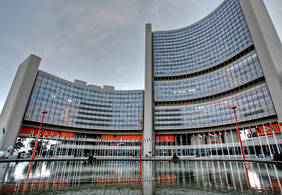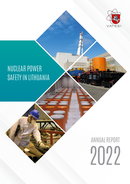The Review Meeting of the Parties to the Convention on Nuclear Safety (CNS) was held at the International Atomic Energy Agency in Vienna from 20 to 31 March 2023. Around 900 representatives from 82 countries attended.
At the review meeting, the Lithuanian delegation formed with representatives of the Ministries of Energy, Environment, Foreign Affairs, the Radiation Protection Centre, the State Enterprise Ignalina Nuclear Power Plant and the State Nuclear Power Safety Inspectorate (VATESI), led by VATESI Head Michail Demčenko, presented the six years’ work on implementation of provisions of the CNS and on ensuring of high level of nuclear safety in Lithuania.
The Lithuanian report provides information that all spent fuel from the two Ignalina NPP units that have been permanently shut down has been safely transferred to the spent fuel storage facility, and that decontamination and dismantling of not necessary systems as well as the management of radioactive waste are being continued.
Lithuania during its national presentation condemned the military aggression by the Russian Federation, which threatens the nuclear safety and security of Ukraine's nuclear facilities. Lithuania also joined Euratom and other Western countries in calling on Russia to withdraw as soon as possible from all nuclear facilities in Ukraine and to hand over control to the Ukrainian authorities, as well as in expressing support for Ukrainian nuclear professionals who work to ensure safety of nuclear power plants, even under such difficult conditions.
The Lithuanian delegation also took an active part in the discussions of other countries' reports. Following the presentation of the Belarus report, the meeting participants’ attention was focused on the unresolved safety issues at the Belarusian NPP, which is located just 40 km from the Lithuanian capital Vilnius and poses unacceptable risks to the Lithuanian population. Not all stress test recommendations have been implemented to date, the design of the plant does not comply with all modern safety requirements and does not include the assessment of the resistance of the structures to the impact of a heavy aircraft. Belarus was also urged to analyse the experience of nuclear safety regulators in other countries and to implement necessary modifications to the Belarusian NPP, and to establish an appropriate mechanism for informing the public and stakeholders about the plant safety. Lithuania's clear position, that the operation and commissioning of Units 1 and 2 of the Belarusian NPP should be suspended until all nuclear safety issues are resolved, was presented.
The report of the meeting adopted by all Contracting Parties to the Convention on Nuclear Safety stresses the need to have plans in place to manage the impact of emergencies such as the COVID-19 pandemic, extreme natural events or military conflicts and to ensure the safety of nuclear installations, to strengthen the capacity of regulators in assessing the safety of new technologies, to foster international cooperation in the field of evaluation safety of small modular reactors, assessing the impact of climate change on the safety of operating nuclear installations, ensuring reliable supply chains of nuclear fuel and spare parts, ageing management, and emergency preparedness, including for the possible radiological consequences of military action in Ukraine.
The next review meeting of the Convention on Nuclear Safety will take place after three years.
News
Results of the Nuclear Safety Convention Review Meeting








